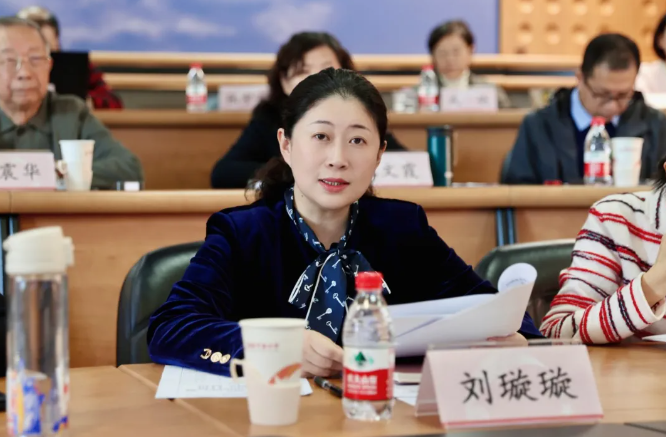 To thoroughly implement the guiding principles of the National Conference on Education and enhance teachers' digital literacy, the School of Foreign Languages at the Open University of China (OUC) recently held an online Smart Teaching Design Case Evaluation for English teachers within its system.
To thoroughly implement the guiding principles of the National Conference on Education and enhance teachers' digital literacy, the School of Foreign Languages at the Open University of China (OUC) recently held an online Smart Teaching Design Case Evaluation for English teachers within its system.
Liu Xuanxuan, deputy secretary of the Party Committee and secretary of the Discipline Inspection Commission of the OUC, attended the event and delivered a speech. Experts from prestigious universities, including Tsinghua University, Renmin University of China, the University of International Business and Economics, Capital Normal University, and Beijing Language and Culture University, served as on-site judges.

Liu Xuanxuan highlighted that the forefront role of artificial intelligence in driving educational transformation is an inexorable trend, and that the improvement of educators' digital proficiency is pivotal to the successful implementation of this transition. She noted that the Party and the state attach great importance to the construction of a strong teaching workforce. At the National Conference on Education, General Secretary Xi Jinping underscored the importance of “implementing the initiatives to enhance the morale and professionalism of teachers with the ethos of educators, emphasising the need to strengthen the professional integrity and conduct of teachers, raise the quality of cultivating and training teachers, and cultivate a high-caliber teaching workforce for the new era”. Teachers in open universities should keep learning, embrace innovation, and act as practitioners of lifelong and digital education. Liu Xuanxuan underscored three strategic priorities for advancing the mission of open universities. Firstly, she emphasised the necessity of consolidating efforts and coordinating development to fully harness the distinctive advantages of open universities, thereby enhancing the digital literacy of the teaching staff. Secondly, she called for an innovation-led approach to stimulate the teaching enthusiasm within the educational system and to delve into the exploration of methods and pathways for the transformation of education and teaching. Thirdly, she advocated for the empowerment of smart technologies, particularly focusing on smart English teaching reforms as a new breakthrough point, to identify effective entry points and to foster the development of academic disciplines and professional programmes.
Xiong Ying, deputy dean of the OUC School of Foreign Languages, made a comprehensive introduction to the background and organisation of the evaluation event. She emphasised that improving teachers' teaching abilities is key to enhancing teaching quality. The participating teachers and teams have carefully designed their cases, making flexible use of smart technologies in intelligent English writing evaluation, oral skills training systems, and adaptive learning systems. These innovations stimulated students' interest and potential, fostered their creative thinking and problem-solving abilities, and contributed to the improvement of teaching quality. The event showcased outstanding cases of smart teaching design by English teachers, setting a benchmark for the promotion of smart English teaching models in the coming year.
Professor Huang Zhenhua, former vice president of the University of International Business and Economics, provided a review of the event on behalf of the expert panel. He offered a comprehensive, detailed, and insightful summary of the evaluation of the smart teaching cases, focusing on the unique characteristics of the OUC system operation, the theoretical knowledge base of the OUC teachers, the integration of ideological and political elements into courses, and the incorporation of smart teaching methods. Additionally, he offered specific suggestions on teaching theory presentation, teaching materials and learning analysis, the creation of PPT materials, and the unique art of lesson plan presentation. He affirmed that this event has played a pivotal role as a directional beacon, guiding the faculty of the OUC in effectively implementing smart teaching methodologies.
With the backing of multiple branches, the event navigated through eight specialised training sessions, preliminary evaluations by individual branches (colleges), and subsequent reviews at the headquarters. The selection process saw nearly a hundred case submissions, with 23 exceptional case works from teachers (and teams) advancing to the final round. The panel of reviewers assessed the entries based on teaching objectives, content, processes, methodologies, and the dimensions of distinctiveness and innovation. The final results of the competition announced that Han Ruifeng from the Fujian Branch won the first prize, Huang Jing from the Beijing Branch secured the second prize, and Han Xue from the Shandong Branch captured the third prize.
Amidst the backdrop of a new era, this case evaluation event plays a pivotal role in steering English teachers within the educational system towards the agile application of AI teaching technologies. It elevates the digital and intelligent teaching proficiency of the system's English educators and solidifies the foundation of fostering virtue and educating people in open education.
Written by Li Chengcheng, photo by Zhuge Huanyu, OUC